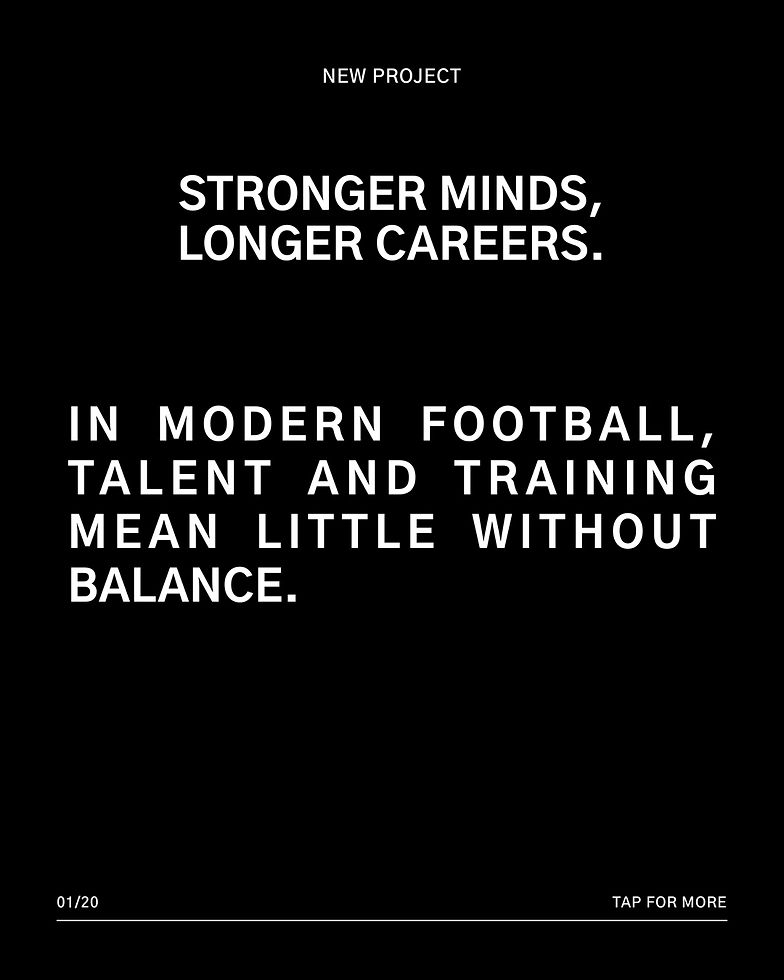
Wellness & Mental Health: Careers Depend on It
- o.a.r.i.a
- Mar 23
- 3 min read
For years, football treated mental health as a silent subject. Toughness was defined by how much pain you could ignore, how many setbacks you could suppress, and how little you revealed of what was happening off the pitch. But the reality has always been different.
Footballers are not machines. They are humans carrying pressure, expectation, and the private battles no one sees. In today’s game, wellness and mental health are no longer afterthoughts — they are career essentials.
The Hidden Weight of Pressure
A professional career may look like a dream from the outside: fame, wealth, adoration. The inside is different. Players live in constant cycles of judgment — contracts that hinge on form, social media criticism after mistakes, families uprooted by transfers, and the fragile reality that one injury can end everything.
Mental health struggles are not a weakness in this environment; they are almost inevitable. The difference lies in how they are addressed. Those who receive support and build wellness into their daily lives find balance. Those who ignore or hide it often see performance collapse, sometimes beyond repair.
The Shift in Culture
The last decade has brought a cultural change. Where mental health was once stigmatized, players today are beginning to speak openly. Andrés Iniesta admitted his battle with depression at the peak of his career. Dele Alli revealed his struggles with addiction and trauma. Their courage redefined the conversation: wellness is not the absence of problems, but the systems and support that allow players to cope and continue.
Clubs, too, are shifting. Many now employ psychologists, wellness specialists, and lifestyle coaches alongside fitness staff. Meditation, breathing exercises, and mindfulness sessions appear on training schedules once reserved only for physical drills. The message is clear: you cannot separate the mind from the body.
Case Study: Marcus Rashford’s Reset
Marcus Rashford’s story shows how wellness and mental health directly influence performance. After carrying the weight of public expectation with England, enduring injury, and navigating fierce criticism, Rashford endured one of the most difficult stretches of his career in 2021–22. On the pitch, his confidence eroded; off it, his energy dimmed.
The reset came not only from tactical adjustments but from rebuilding balance off the field. With support networks, a new routine, and attention to his mental state, Rashford returned in 2022–23 revitalized. His resurgence was not simply technical — it was the product of restored wellness. His case is proof that careers hinge on the mind as much as the body.
Wellness as Performance Fuel
The science is unambiguous: mental health influences sleep, energy, focus, and decision-making. A player carrying hidden anxiety or stress is more prone to injury, slower to recover, and less sharp under pressure. Conversely, a player with a strong wellness foundation is calmer, clearer, and capable of sustaining performance.
Wellness is not indulgence. It is fuel. From structured rest days to mindfulness routines, from community support to family stability, the systems that protect mental health are the same systems that protect careers.
Looking Forward
For enthusiasts, the shift is fascinating to watch. Football, once seen as the most macho of sports, is now becoming a model for embracing mental health. This is not weakness but evolution. The game is maturing, understanding that the icons who inspire millions must also be cared for as people.
The next generation of footballers will grow up with wellness as part of their craft, not a hidden struggle. Fans will see not just goals and trophies, but the unseen work players put into maintaining balance. Careers will be longer, healthier, and more sustainable because the mind is finally given the respect it deserves.
As Kevin Love, the NBA star who became one of the first athletes to speak openly about mental health, once said: “Everyone is going through something that we can’t see.” Football is learning that truth. Wellness is not luxury. It is survival.



Comments